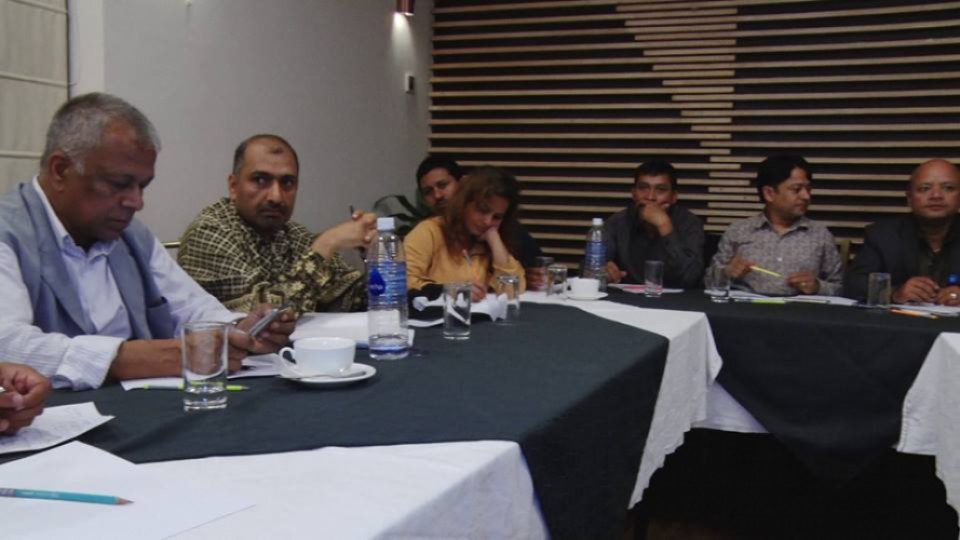
On Saturday July 29, 2017, Kathmandu
- Facilitated by: Former Minister Er. Ganesh Shah
- Coordinated by :Mr. Guna Raj Dhakal
- Managed by : Mr. Purna N. Ranjitkar
- Presentation by : Jyoti Giri, TU, Ctri-Chandra College, Kathmandu
Dr. Keshav Parajuly (via internet)
Rapid changes in technology, design and facilities within the electronic products and gadgets the users cannot stop to get them immediately is one reason that e-wastes are generated in hipped volume. Likewise, falling prices, and planned obsolescence have resulted in a fast-growing surplus of electronic waste around the globe. The most voluminous items are said to be TV sets, computer sets, mobile phones, household equipments.
Technical solutions are available, but in most cases, a legal framework, a collection, logistics, and other services need to be implemented before a technical solution can be applied. The e-waste problem could potentially be solved with modular smart phones or Phonebooks. These types of phones are more durable and have the technology to change certain parts of the phone making them more environmentally friendly.
As e-waste are non biodegradable and cause harmful effects on environment, humans and animals due to their radioactive and other heath affecting, polluting properties. Reuse is the method by which you can use many important e-wastes again and again without spending money on new materials. Also, this will help save some economy of country like Nepal where everything has to be imported from other countries.
E-waste is found to be an integral part of the existing solid waste management chain and, therefore, needs to be addressed collectively. Challenges and opportunities towards building a sustainable system for managing e-waste, and offer propositions for a resource-oriented waste management system is posing. However, Nepal has yet to fully realize e-waste as problem which could be multiplied in near future. The need for proper e-waste management has increased in the country, more so in the capital, where almost all households have multiple sets of mobile phone, radio, television, computer, and other electronic devices. Thus, policies to managed e-waste have been a must now.
Likewise, Lead Acid Batteries are one other big risk bearing item in Nepal. They are used in vehicles, electricity back up and as solar electricity storing devices. Around 40% batteries are manufactured in Nepal while 60% are imported. After life of lead acid batteries approximately 3 million liter of acid is disposed in the soil without any treatment. The open disposing of acid of batteries fully damages the soil for 100 years, experts say.
Experts argue that plastic products have been taken as the biggest issue in Nepal and rest of the world. Almost all consumer items are made of plastic and plastic related products including angioplasty, the device used for serious heart patient is made of plastic. As such, people need to use properly and efficiently as most of electric and electronic devices are made of plastic and, metals and toxic chemicals, they need to be recycled so as e-waste could cause minimum negative impacts to human life and nature. Thus, the state regulations must be abiding devices manufacturers to be responsible. As such, effective regulation in this regards is also sought by experts.
Individuals or institutions that generate e-waste are identified as electrical and electronic appliance manufacturers, business houses, institutions, government offices, house-hold applications, small business, and repair shops. Thus, the biggest problem with regard to e-waste management is the lack of proper laws in the country, experts say. The users who cannot remain without getting best of latest gadget must be aware. Experts also warn that impacts of e-wastes in human and environment cause cancer, reproductive disorder due to poisonous gases released during incineration. Fatigue, appetite loss, muscular pain, headache, lung cancer, nervous system failure, skin irritation, memory loss are some e-waste born maladies. Soil gets quality deteriorated by many metal ions and poisonous materials, polymer resin, become acidic, infertility. Likewise water sources get contaminated. And many more such undesirable impacts take place due to haphazard dumping of e-waste.
Uprising problems of E-Waste
The government ministries, departments and agencies, local authorities now must pay due attentions.
The administrations, systems, importers, vendors and users must be well aware of negative impacts so as those who are engaged in handling e-waste with or without sufficient knowledge must be careful. According Ms. Giri, main challenges of e-waste management are (1) Proper knowledge of disposal to consumers, (2) Technology and skills, (3) Good industrial design, (4) Policy and legislation, (5) Business and finance, and (6) Requires combination of community and industrial responsibility
Mr. Chaitanya Prakash Chaudhary of Alternative Energy Promotion Centre said that used lead acid batteries are haphazardly disposed and taken out of country without any proper treatment or care. Recycling plant only can manage such used batteries so that a plant for this purpose can solve the problem.
The programme organised on Saturday July 29, 2017 was facilitated by Former Minister for Science and Technology Er. Ganesh Shah and welcome and concluding notes were delivered by Mr. Guna Raj Dhakal, RECoN chairperson.
Conclusion
The participants, RECoN and the associated personalities realized that necessary actions should be taken at the earliest in formulating legal provisions to control electronic waste in Nepal. As such, meeting with concerned officials and authorities should be carried out by relevant institutions.




